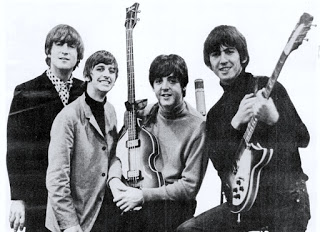

| Online: | |
| Visits: | |
| Stories: |

| Story Views | |
| Now: | |
| Last Hour: | |
| Last 24 Hours: | |
| Total: | |
The biologist's fallacy – or how poor Armand confused influence and copying
By Brian Clegg
 |
| Image from Wikipedia |
There's been a bit of a buzz on social media of late as a result of a story that professor of evolutionary biology Armand Leroi claimed that the Beatles did not have much influence on popular music in the US. The posts have referenced newspaper articles like this, based on this original paper.
This is all odd for a number of reasons. First this all came out in 2015, so it's not exactly new. (It's probably because there's a TV programme about it this week.) But I still think it's worthy of comment. Secondly, why music in the US, rather than the UK? But most importantly, poor old Armand and his mates entirely missed the point, as sometimes tends to happen when evolutionary biologists extend their models beyond their field of expertise.
I'd suggest the reason that this result is so counter-intuitive – no, let's be frank, wrong – is that Armand et al (sorry for being so familiar, but I can't help but call Dr Leroi that – I don't know why) are assuming that a biological process is a direct parallel for a creative process. In biology, genetic factors are passed on by a copying mechanism. So they assume a measure of musical influence must be copying. But musical influence isn't primarily about this – it is just an occasional side effect.
That copying isn't central is entirely clear when you think that, for instance, lots of writers are hugely influenced by music. I certainly am. But, strangely, you don't see any chord sequences in my writing. Similarly, the way that a group influences other musicians is not about reproducing musical structures. It's about whether or not their music was a formative part of the musicians' lives – and it would be hard to find any musician who was alive in the mid-sixties who hasn't been influenced by the Beatles.
Just to give one well-documented example – if you based your idea of 'influenced' on copying, nothing is further from the wondrous sophistication (or overblown grandiosity, depending on your preferences) of prog rock than punk. And yet, The Sex Pistols admitted that the music they listened to most as they drove from gig to gig was Pink Floyd. It was perfectly possible to be inspired by Pink Floyd's work to do something that is musically diametrically opposed to it.
Sorry, Armand et al. Genetic processes can be overstretched when applied as models where they don't belong. Step away from the physics envy.
Now Appearing is the blog of science writer Brian Clegg (www.brianclegg.net), author of Inflight Science, Before the Big Bang and The God Effect.
Source: http://brianclegg.blogspot.com/2017/03/the-biologists-fallacy-or-how-poor.html


